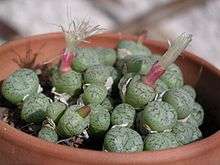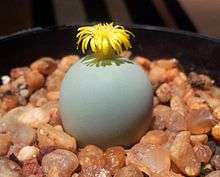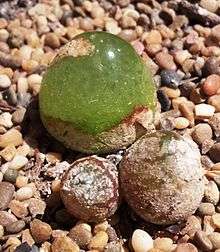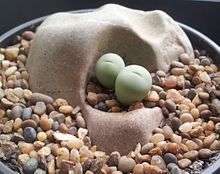Conophytum
Conophytum is a genus of South African and Namibian succulent plants that belong to the Aizoaceae family. The name is derived from the Latin “conus” (cone) and Greek “phytum” (plant). The plants are also known as knopies (buttons), waterblasies (water blisters), sphaeroids, conos, cone plants, dumplings, or button plants.
Taxonomy
The genus is sometimes wrongly referred to as Conophyton, the name that Adrian Hardy Haworth suggested in 1821: "If this section proves to be a genus, the name of Conophyton would be apt". However, this was too tentative to establish a validly published generic name and also, Haworth himself neither adopted it nor accepted the genus. The genus was neither recognised nor validly named until the name Conophytum was published 101 years later.[1]
Description
Conophytum species are dwarf cushion-forming or single-bodied succulents. Members of the genus are tiny plants with succulent leaves ranging from 1/4" to 2" in length. These leaves are partially or entirely fused along their centers. Each leaf pair (together referred to as a body) ranges in shape from "bilobed" to spherical to ovoid to tubular to conical. Some species have epidermal windows on the top of their leaves. To the naked eye the epidermis ranges from very smooth to slightly rough to hairy, depending on the microscopic epidermal cell shape and structure. In their normal, natural state each stem has only one pair of leaves at a time though one plant may have dozens of stems and thus dozens of leaf pairs. When very heavy rains come to their native habitat they may grow luxuriantly and develop two leaf pairs per stem simultaneously; this is called "stacking up" of the leaves.
Species
This is a list of species in the genus Conophytum.[2]
- Conophytum achabense
- Conophytum acutum
- Conophytum albiflorum
- Conophytum angelicae
- Conophytum armianum
- Conophytum arthurolfago
- Conophytum auriflorum
- Conophytum bachelorum
- Conophytum bicarinatum
- Conophytum bilobum
- Conophytum blandum
- Conophytum bolusiae
- Conophytum breve
- Conophytum brunneum
- Conophytum bruynsii
- Conophytum burgeri
- Conophytum calculus
- Conophytum caroli
- Conophytum carpianum
- Conophytum chauviniae
- Conophytum chrisocruxum
- Conophytum chrisolum
- Conophytum comptonii
- Conophytum concavum
- Conophytum concordans
- Conophytum cubicum
- Conophytum depressum
- Conophytum devium
- Conophytum ectypum
- Conophytum ernstii
- Conophytum ficiforme
- Conophytum flavum
- Conophytum francoiseae
- Conophytum fraternum
|
- Conophytum friedrichiae
- Conophytum frutescens
- Conophytum fulleri
- Conophytum globosum
- Conophytum halenbergense
- Conophytum hammeri
- Conophytum hermarium
- Conophytum herreanthus
- Conophytum hians
- Conophytum irmae
- Conophytum jarmilae
- Conophytum joubertii
- Conophytum jucundum
- Conophytum khamiesbergense
- Conophytum klinghardtense
- Conophytum kubusanum
- Conophytum limpidum
- Conophytum lithopsoides
- Conophytum loeschianum
- Conophytum longibracteatum
- Conophytum longum
- Conophytum luckhoffii
- Conophytum lydiae
- Conophytum marginatum
- Conophytum maughanii
- Conophytum meyeri
- Conophytum minimum
- Conophytum minusculum
- Conophytum minutum
- Conophytum mirabile
- Conophytum obcordellum
- Conophytum obscurum
- Conophytum pageae
- Conophytum pellucidum
|
- Conophytum phoeniceum
- Conophytum piluliforme
- Conophytum praesectum
- Conophytum pubescens
- Conophytum pubicalyx
- Conophytum quaesitum
- Conophytum ratum
- Conophytum reconditum
- Conophytum regale
- Conophytum ricardianum
- Conophytum roodiae
- Conophytum rugosum
- Conophytum saxetanum
- Conophytum schlechteri
- Conophytum semivestitum
- Conophytum smorenskaduense
- Conophytum stephanii
- Conophytum stevens-jonesianum
- Conophytum subfenestratum
- Conophytum subterraneum
- Conophytum swanepoelianum
- Conophytum tantillum
- Conophytum taylorianum
- Conophytum tomasi
- Conophytum truncatum
- Conophytum turrigerum
- Conophytum uviforme
- Conophytum vanheerdei
- Conophytum velutinum
- Conophytum verrucosum
- Conophytum violaciflorum
- Conophytum wettsteinii
|

Conophytum seitubum
 |
Wikimedia Commons has media related to Conophytum. |
References
- ↑ McNeill, J. et al (eds) "International Code of Botanical Nomenclature (Vienna Code). Regnum Vegetabile" 146. A.R.G. Gantner Verlag 2006. KG. ISBN 3-906166-48-1
- ↑ Hammer, S.(2002) Dumpling and His Wife: New Views of the Genus Conophytum EAE Creative Colour Ltd. ISBN 0-9539326-1-3





